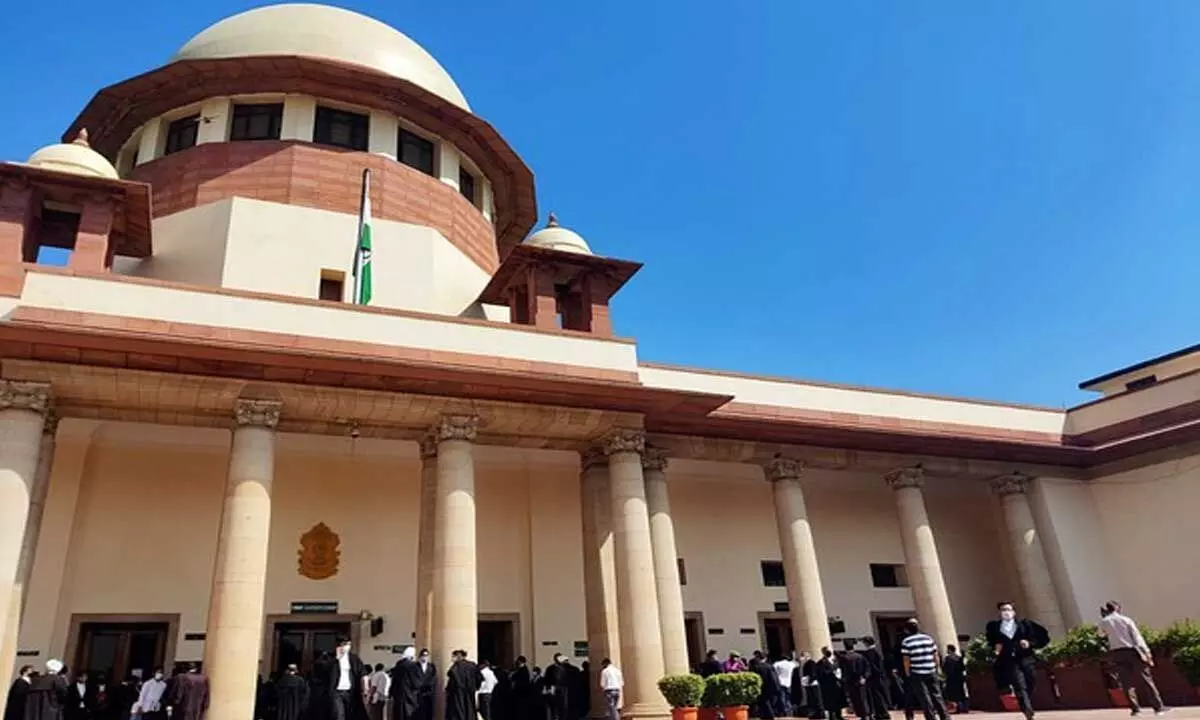Live
- They always want me to win, and now I feel lucky to have been offered a story like ‘Zebra’: Satyadev Kancharana
- ‘Democracy first, humanity first’: PM Modi in Guyana's parliament on two countries' similarities
- PKL Season 11: Telugu Titans register third straight win to top standings
- Is Pollution Contributing to Your COPD?
- NASA Unveils Underwater Robots for Exploring Jupiter's Moons
- Additional Central forces arrive in violence-hit Manipur
- AR Rahman and Saira Banu’s Divorce: Legal Insights into Common Issues in Bollywood Marriages
- 82.7 pc work completed in HPCL Rajasthan Refinery area: official
- Curfew relaxation extended in 5 Manipur districts on Friday
- Tab scam prompts Bengal govt to adopt caution over fund disbursement
Just In
Charge sheets don't come under RTI, free access may violate accused's rights: Supreme Court

Supreme Court of India
The Supreme Court on Friday junked a PIL seeking free public access to charge sheets filed by police departments and investigative agencies - CBI and ED -- saying that a charge sheet is not a public document.
New Delhi: The Supreme Court on Friday junked a PIL seeking free public access to charge sheets filed by police departments and investigative agencies - CBI and ED -- saying that a charge sheet is not a public document.
It also held that copies of the charge sheet and the relevant documents along with the charge-sheet do not fall within Section 4(1)(b) of the Right to Information ActA(RTI) Act.
A bench of Justices M.R. Shah and C.T. Ravikumar said: "Putting the FIR on the website cannot be equated with putting the charge sheets along with the relevant documents on the public domain and on the websites of the state governments."
It stressed that if charge sheets are put on the public domain, then it will be contrary to the scheme of the Criminal Procedure Code and may also violate the rights of the accused as well as the victim and/or even the investigating agency.
"Copies of the chargesheet and the relevant documents along with the charge sheet do not fall within Section 4(1)(b) of the RTI Act. Under the circumstances also the reliance placed upon Section 4(1)(2) of the RTI Act is also misconceived and misplaced."
Advocate Prashant Bhushan, representing petitioner Saurav Das, cited the apex court decision in the Youth Bar Association of India case, where it directed copies of FIRs to be published within 24 hours of their registration on the police websites or on the websites of the state governments.
In connection with publication of FIRs, the bench said this direction was passed looking into the interest of the accused and so that the innocent accused are not harassed and they are able to get the relief from the competent court and they are not taken by surprise.
"Therefore, the directions issued by this court are in favour of the accused, which cannot be stretched to the public at large so far as the charge sheets are concerned," said Justice Shah, who authored the judgment on behalf of the bench.
Bhushan had cited the scheme of the Code of Criminal Procedure, particularly Sections 207, 173(4) and 173(5) to support his case. He vehemently argued that as per the aforesaid provisions when a duty is cast upon the investigating agency to furnish the copy of the challans/charge sheets along with all other documents to the accused, the same also should be in the public domain to have the transparency in the working of the criminal justice system.
The bench said the relief which is sought in the present writ petition directing that all the challans/charge sheets filed under Section 173 CrPC. shall be put on public domain/websites of the state governments shall be contrary to the scheme of the Criminal Procedure Code.
Citing CrPC sections, the bench added that the investigating agency is required to furnish the copies of the report along with the relevant documents to be relied upon by the prosecution to the accused and to none others.
"Therefore, if the relief as prayed in the present petition is allowed and all the charge sheets and relevant documents produced along with the chargesheets are put on the public domain or on the websites of the state governments, it will be contrary to the scheme of the Criminal Procedure Code and it may as such violate the rights of the accused as well as the victim and/or even the investigating agency," said the bench.
Citing Section 74 of the Indian Evidence Act, Bhushan argued that charge sheets were "public documents", which can be accessed.
Dismissing the petition, the bench said: "Documents mentioned in Section 74 of the Evidence Act only can be said to be public documents, the certified copies of which are to be given by the concerned police officer having the custody of such a public document. Copy of the charge sheet along with the necessary documents cannot be said to be public documents within the definition of public documents as per Section 74 of the Evidence Act."

© 2024 Hyderabad Media House Limited/The Hans India. All rights reserved. Powered by hocalwire.com






